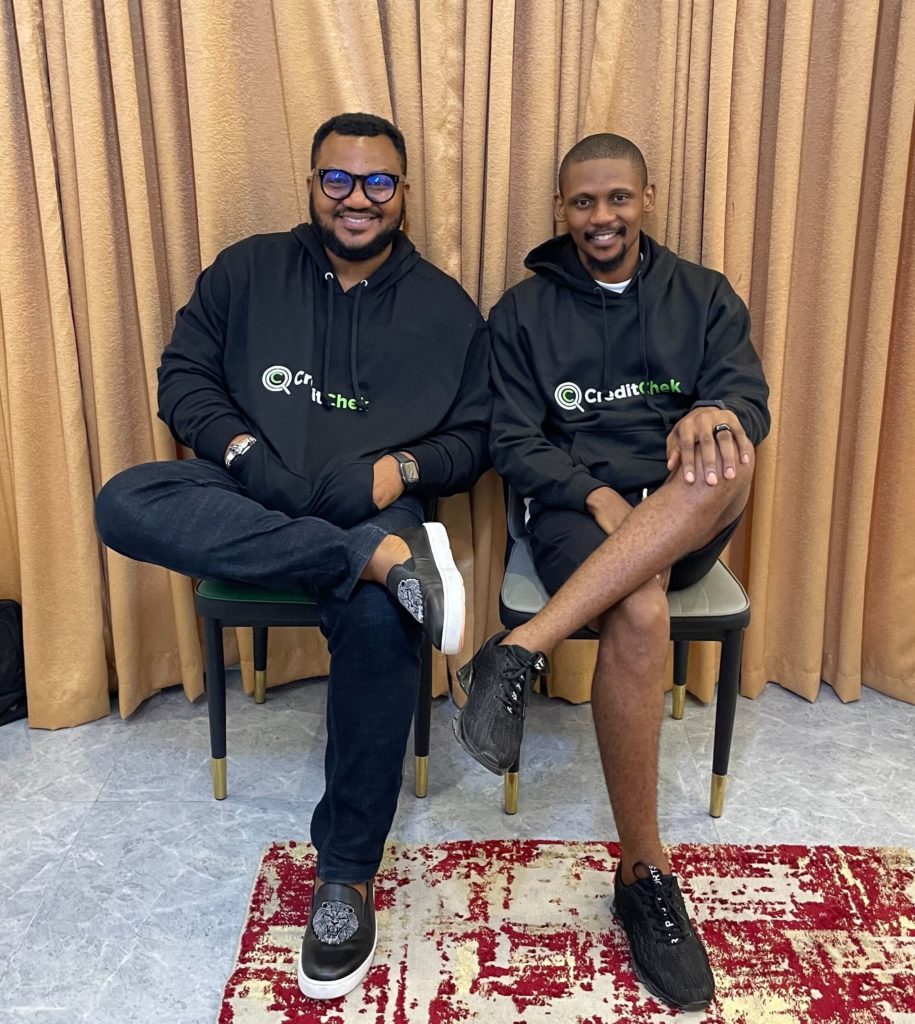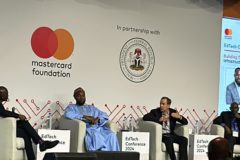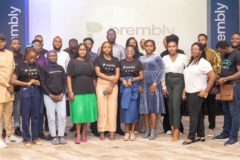
Kingsley Ibe and Lionel Orishane are brothers-in-law trying to develop a credit score system for “underserved” Africans. They both have extensive experience in the African technology ecosystem and want to leverage this experience to reduce the occurrence of bad loans for lending businesses.
How did the idea for CreditChek develop?
Kingsley: I started my tech career as an early employee in the Jumia Group and left in 2016. In 2017, I founded a company called Price Slash, an e-commerce company. However, we shut down the company due to a lack of investment. Investors referenced how Jumia and Konga were faring as their reason for not investing. In 2018, Abdulhamid Hassan and I launched OyaPay which we ran for over a year before a majority of the team moved to Paystack. It was around this time that I started piloting the idea of providing micro-loans to small businesses.
The idea was spurred by the demand for these loans by the merchants on OyaPay, and this demand led me to start MicroMoni, a lending company. In 2019, we provided loans to more than 300 businesses; and by the end of 2019, we were acquired and merged with AjoCard, [a fintech company for the unbanked]. It made sense at the time because they were a mobile money company that was looking to scale. They were already venture-backed and had a microfinance bank license. They had all we needed. I worked with AjoCard for almost two years, and it was during my time there that the idea for CreditChek was born.
Lionel: Compared to Kingsley, this is my first venture into the startup space. I have been in the big tech environment for the past 15 years. I am a systems engineer that studied computer science before pivoting to systems administration. Since 2011, I have been a cyber security consultant, and I have been privileged to work in a host of countries in sub-saharan Africa. With my experience in core engineering and my understanding of project management and software development, it was easy to partner with Kingsley on building CreditChek.
How did the two of you meet?
Kingsley: Lionel and I are in-laws. We are both married to sisters in the same family.
Lionel: Perhaps we are the first case of brothers-in-law being co-founders in the industry. I don’t think I have heard of other brothers-in-law having a startup together.
Kingsley: That’s what led to us starting this idea. We were at my house celebrating my wife’s birthday. Lionel was around, and I was narrating to him my experience running MicroMoni. With MicroMoni, 40–60% of our loans came back as bad loans. We also had the same issues during my time at AjoCard. Lionel also narrated his problems in trying to access a mortgage. Based on that, we realised that there is a massive gap, and we felt like we could solve this problem with CreditChek.
It says on your website that your company serves the underserved. How do you do that?
Kingsley: I wouldn’t say we serve the underserved, even though the later effect of our solution is to help the underserved. We are a business-focused platform. Our goal is just to provide access to data for lending businesses. Based on that data, they can make more informed decisions when providing loans to underserved Africans.
How do you gather this data?
Kingsley: We gather data from multiple sources like credit bureaus and banks. We also explore other sources of data like telecommunication companies and mobile money operators.
How do you integrate all this data to provide a reliable source of information to lending companies?
Kingsley: We decided to start from scratch by seeking out the easiest source of historical data, and we realised that credit bureaus hold this type of data. Lending companies have often found it difficult to access this data. We are connected to credit bureaus and harmonised that data such that lending businesses can easily access that data and break all the barriers that are currently limiting them. We made that access very simple and easy for these businesses. They can access that data without actually needing to plug into credit bureaus.
For banking data, most microfinance banks access data by either requesting a PDF statement and then manually accessing that statement, or they can plug into the likes of Mono [a banking platform for businesses] and access transaction data. With the latter option, they only have access to the data, so they still have to assess customers’ creditworthiness.
What we have done is not reinvent what Mono has done but create a top layer by changing the way lending businesses make use of this data. We automate that process and make it as simple as possible. At the click of a button, they can easily see what someone’s average income is, their expenses, and their debt-income ratio.
What problems have you encountered with CreditChek?
Kingsley: The first problem we faced was having to change our business model. We initially started as a consumer service, and we quickly realised that that wasn’t a sustainable business model. We didn’t have the capital to scale, and we didn’t feel that all our money should go into advertising and customer acquisition. It took us about 3 months to pivot from a B2C to a B2B model.
Another problem we faced was securing partnerships with some external stakeholders. This problem was really an issue of trust— we had to convince these stakeholders that we weren’t in competition with them, but simply interested in building sustainable relationships.
Since your launch, how have you measured your impact?
Kingsley: To date, we have processed almost 5,000 API calls and onboarded more than 30 businesses to the platform. Those businesses have gone on to run assessments for thousands of customers. For us, that is where the impact is. We are building trust between lenders and customers. We help businesses understand the customers’ financial position and whether it is advisable to offer them loans. We also recommend an eligible amount to lenders to loan out to customers.
For customers, we also help them by telling businesses the terms of their previous loans. We will notify the company of the customer’s default on previous loans if the loan’s terms are so unfavourable that repaying it was practically impossible.
On your website, it says that all the data you use is user-permissioned. How do you get permission from users?
Kingsley: First of all, we are Nigerian Data Protection Regulation (NDPR)-compliant, which means that every data we collect has to be user-permissioned. We collect their permission by requesting every lender that wants to use our platform to send a consent form through us. Typically, most platforms give you a memorandum of understanding or a non-disclosure agreement to sign. We make sure that the consent form is provided to the customer, and after filling it out, they have to indicate that they want to allow the lender on our platform to access their credit history.
When it is completed, a dashboard that is shown to businesses reveals the results. Without the consent form, lenders can not access our platform.
How much have you raised so far?
Kingsley: We have raised a $240,000 pre-seed round.
How did you choose your investors?
Kingsley: We have tried to be very strategic in choosing investors that will add value to our business. We look at the current portfolio of the investors and if they have invested in similar companies that we can add value to. We have raised investment from Atom Capital. They led our pre-seed round and they invested in us via referrals. The CEO of Chipper Cash, Ham Serunjogi, has also invested in us and for us, that is very strategic. Chipper Cash operates on a global scale, and we feel like we can plug into that growth for when we want to scale our services. We also raised funds from Aidi Ventures which is led by Gbolade Emmanuel, the CEO of Termii. Adamantium Funds, owned by Olumide Ogunsanwo also invested in us and he has been so influential in getting us the businesses that we have onboarded on our platform and our growth strategy. Isaac Ewaleifoh has also invested in us as a way to get value for his help in introducing investors. Assembly Investors also invested in us.
What is your plan for utilising your pre-seed round funding?
Kingsley: Our goal is to build a more robust technology and expand our team and our marketing efforts. We also want to pursue more profitable partnerships.




















